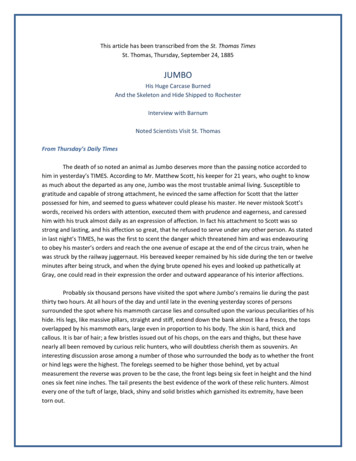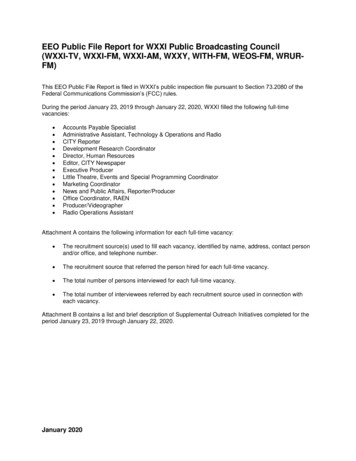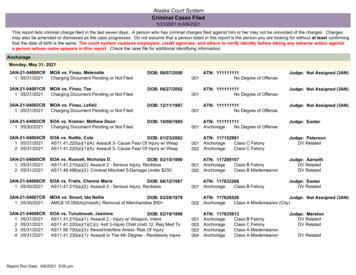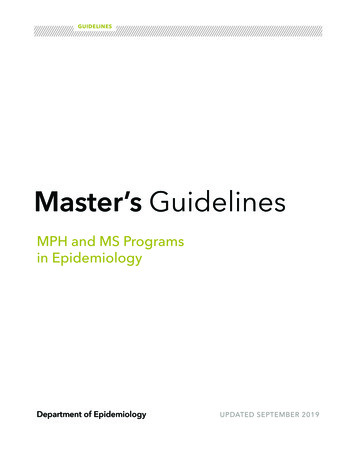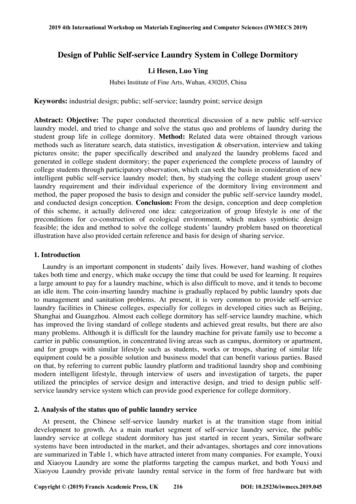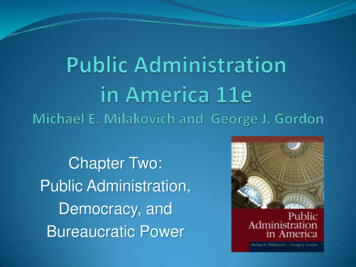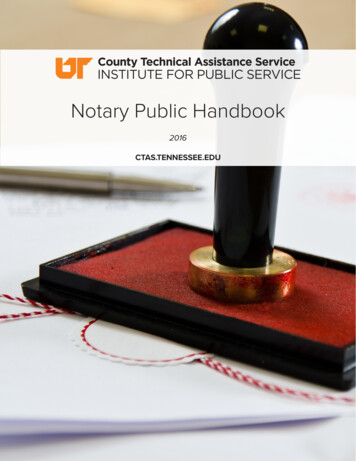
Transcription
Notary Public Handbook2016CTAS.TENNESSEE.EDU
Notary Public HandbookDeveloped and published by.Revised June 2016This publication is provided as a courtesy to Tennessee County Clerks. For more information aboutlaws related to notaries public, please visit our electronic library, e-Li, athttp://eli.ctas.tennessee.edu or contact the Tennessee Secretary of State’s office athttp://sos.tn.gov/notary-commissions.For any questions about this publication, please contact Liz Gossett, CTAS E-Media & InformationSpecialist, at (615) 532-3555 or liz.gossett@tennessee.edu.1
Table of ContentsIntroduction3Notaries Public3Powers, Duties, Fees, Records, and Liabilities6Affidavits, Acknowledgments, and Depositions7Sample Notary Application11Sample Notification of Change of Address Tennessee Notary Public132
IntroductionA notary public is considered a state official with statewide jurisdiction whose powers and dutiesare defined by statute. Op. Tenn. Atty. Gen. 07-157 (11/26/07). It is a relatively simple matter tobecome a notary public but the office has important responsibilities, limitations, and liabilitypotential that should be fully recognized.This handbook, intended as a general guide and not an authority, is especially designed toassist non-attorney notaries with the general requirements, duties, powers, limitations, liabilities,and legal significance of their actions as a notary public.Legal counsel should be consulted whenever specific problems or questions arise concerningany aspect of the office of notary public. All fees quoted in this publication are as of the date ofthe writing and should be verified by consulting the Tennessee Code Annotated, referred toherein as T.C.A.Additional information about notaries is available from the Tennessee Secretary of State's office.Notaries PublicQualifications. As a public official, a notary public must meet the general qualifications forholding office set out in T.C.A. § 8-18-101, as well as the specific requirements contained in thenotary statutes at T.C.A. § 8-16-101. A notary must be at least 18 years of age and be either aUnited States citizen or a legal permanent resident at the time of election. Further, a notary mustbe a resident of or maintain a principal place of business in the county from which he or she iselected at the time of election. T.C.A. § 8-16-101. A person with a principal place of business inany Tennessee county may be elected a notary in that county even though that person’sresidence is in another state. United States citizenship is not a requirement of the office. Acounty legislative body member is not prohibited from serving as a notary public; however, suchmember may not vote on his or her appointment as a notary.A person must certify under penalty of perjury that the person—1. Has never been removed from office as a notary for official misconduct;2. Has never had a notarial commission revoked or suspended by this or any other state; and3. Has never been found by a court to have engaged in the unauthorized practice of law.T.C.A. § 8-16-101.A person is disqualified from holding the office of notary public if that person—1. Has been convicted of offering or giving a bribe, larceny or any other offense declaredinfamous by law (unless restored to citizenship);2. Is a person against whom there is an unpaid judgment for money received by them in anofficial capacity and due to the United States, to Tennessee, or any Tennessee county;3. Is a person who is a defaulter to the treasury at the time of election;4. Is a soldier, seaman, marine, or airman in the regular army, navy, or air force of the UnitedStates; or5. Is a member of congress or a person holding any office of profit or trust under any foreignpower, other state, or the United States. T.C.A. § 8-18-101.3
It is a misdemeanor to take office as a notary public if a disqualification exists. T.C.A. §8-18-102. A notary public may be removed from office in an ouster proceeding just as any otherpublic official. T.C.A. § 8-47-101 et seq.Election to Office and Commission. A notary public is elected by the members of the countylegislative body in the county where the notary then resides or maintains a principal place ofbusiness. T.C.A. § 8-16-101. After election, a notary must be approved and commissioned bythe governor. T.C.A. §§ 8-16-102, 8-16-106.Applications for election as a notary, together with the application fee of 12, are submitted tothe county clerk. After election by the county legislative body, the county clerk certifies thenotary’s election to the Secretary of State. The county clerk retains 7 of the application fee andsubmits the remaining 5 to the Secretary of State for the issuance of the commission. Whenthe commission is issued by the governor, the Secretary of State forwards it to the county clerk.T.C.A. § 8-16-106. The county clerk will then notify the applicant that the commission has beenreceived. After the person has submitted the bond and taken the oath of office as required, thecounty clerk may deliver the commission to the new notary public. T.C.A. § 8-16-107.Bond. After election by the county legislative body and before commencing duties or exercisingpowers, a notary must post bond by a surety company authorized to do business as a surety inTennessee, or with two or more good personal sureties, approved by the county legislativebody, in the amount of 10,000. The bond is payable to the state and conditioned on the faithfulperformance of the duties of a notary public. The bond must be filed in the office of the countyclerk in the county of election. T.C.A. § 8-16-104. The county clerk may charge 2.00 for takingand recording the bond. T.C.A. § 8-21-701.Oath. The notary must also take and subscribe to an oath before the county clerk or a deputycounty clerk to support the constitutions of the State of Tennessee and the United States, andthat the notary will, without favor or partiality, honestly, faithfully, and diligently discharge theduties of notary public. T.C.A. § 8-16-105.Term. The notary’s term is four years, beginning on the date of issuance of the commission bythe governor. T.C.A. § 8-16-103. Renewal is by the same method as the original procedure. It isa Class C misdemeanor for any person who has been commissioned as a notary public to takean acknowledgment or otherwise to act in an official capacity after the expiration of the notary’scommission. T.C.A. § 8-16-120.Official Seal. State law requires that all notaries use an official seal prescribed and designed bythe Secretary of State. The notary must purchase the official seal at his or her own expense. Atthe notary’s request, the county clerk may obtain an official seal for the notary, and the countyclerk may charge a fee for this service not to exceed 20 percent of the cost of the seal.T.C.A. § 8-16-114.The current design prescribed by the Secretary of State is a circular sealwith the notary’s name (as it appears on the commission) printed at thetop, the county of election printed at the bottom, and the words “State ofTennessee Notary Public” or “Tennessee Notary Public” printed in thecenter.4
The seal may be imprinted by a rubber or other type stamp (not an impression seal), and thestamp must be imprinted in some color, not black or yellow, that is clearly legible and appearsblack when copied on a non-color copier. Notaries may continue to use their impression sealsuntil the expiration of their term. The use of an embossed seal after May 12, 2003, does notrender an acknowledgment defective. T.C.A. § 8-16-114.Additional information concerning the seal may be obtained from the Secretary of State’sDivision of Business Services, which can be accessed from the Secretary of State’s website athttp://sos.tn.gov/business-services.The seal must be surrendered to the county legislative body (through the county clerk) uponexpiration of the notary’s term of office or resignation, and the personal representative mustsurrender the seal in the event of the death of the notary. T.C.A. § 8-16-114.Change of Name. If a notary public's surname changes, the notary shall notify the county clerkof the county from which the notary was elected and commissioned and shall pay to suchcounty clerk a fee of seven dollars ( 7.00). The county clerk shall thereupon notify the Secretaryof State of the change of address or name change and forward to the Secretary of State twodollars ( 2.00) of the seven-dollar fee received from the notary. T.C.A. § 8-16-109.Moving Out of the County of Election. If a notary moves his or her residence or principalplace of business out of the county from which he or she was elected to another county inTennessee, the notary remains qualified to act as a notary in Tennessee but the notary mustnotify the county clerk in the county from which the notary was elected and pay to the countyclerk a fee of 7. The county clerk then notifies the Secretary of State of the change of addressand forwards to the Secretary of State 2 of the 7 fee paid by the notary. T.C.A. § 8-16-109.Moving Out of Tennessee. If a notary moves out of the State of Tennessee and has neither aresidence nor a principal place of business in Tennessee, the notary is no longer qualified to actas a Tennessee notary public and must surrender his or her commission. It is a Class Cmisdemeanor for a person to act as a notary after moving out of Tennessee. T.C.A. § 8-16-110.Powers, Duties, Fees, Records, and LiabilitiesPowers. A Tennessee notary public is authorized to act in any county in Tennessee and has thepower to acknowledge signatures upon personal knowledge or satisfactory proof, to administeroaths, to take depositions, qualify parties to bills in chancery, and to take affidavits. T.C.A. §8-16-112. A notary is authorized to take acknowledgments, and to certify the probate oracknowledgment of a deed or other instrument to the county clerk. T.C.A. §§ 66-22-102,66-22-105. A notary is also authorized to do formal protests of negotiable instruments, but thispublication does not deal with the protest of a negotiable instrument because it is rarely used;an attorney should be consulted if this is required. T.C.A. § 24-5-103. A notary public can takean acknowledgment or affidavit of a nonresident of the State of Tennessee if that person isphysically present within this state. A notary should not acknowledge his or her own signaturenor notarize any signature if he or she is a party to the transaction or an agent of a party takingan acknowledgment. A notary should not notarize his or her spouse's signature because of therequirement that notaries discharge their duties "without favor or partiality." Op. Tenn. Atty. Gen.10-97 (9/13/10). Attestations, protestations, and other evidence of publication or5
acknowledgment made by a notary public under seal will be received into evidence. T.C.A. §8-16-116.Duties. A notary must sign all documents in ink by his or her own hand, and affix the notary’sofficial seal. T.C.A. § 8-16-112. The official signature of the notary should reflect the notary’s titleas a notary public for the State of Tennessee. T.C.A. § 8-16-113. The true date of expiration ofthe notary’s commission is required to be included on every certificate of acknowledgmentexecuted by a notary, but a failure to do so will not invalidate the instrument. T.C.A. § 8-16-115.However, where the true date of expiration shows the commission has expired, the certificate ofacknowledgment will be invalid. Haynes v. State, 374 S.W.2d 394 (Tenn. 1964).Fees. Notaries and their employers may demand and receive reasonable fees andcompensation for the notary's services. T.C.A. § 8-21-1201. Specific fees are not set out in thestatute.Records. If a notary charges a fee, the notary must keep a record either in an appropriateelectronic form or a well-bound book of each of his or her attestations, protestations, and otherinstruments of publication. T.C.A. § 8-21-1201. A record of fees received should also be kept forincome tax records. While no record is required if no fee is charged, it is recommended thatevery notary keep a record of his or her acts in a well-bound book or electronic file, whichshould include the following:The date of the acknowledgment, affidavit or other transaction;The name of the person whose signature is being notarized;To whom the instrument is being executed;A description, including the date, of the instrument;Whether the person whose signature was notarized was a personal acquaintance or whatproof was shown prior to notarizing the signature (see definition of “satisfactory evidence,”discussed later); and6. What fee, if any, was received.1.2.3.4.5.Notaries Employed by Financial Institutions. If a notary is an employee of a financialinstitution subject to the Financial Records Privacy Act, compiled in title 45, chapter 10, and thenotary or employer of the notary charges a fee, and the services performed by the notary arepart of the notary's duties and within the scope of the notary's employment, then access to therecord shall be governed by the Financial Records Privacy Act, or the federal Right to FinancialPrivacy Act of 1978 (12 U.S.C. § 3401 et seq.), whichever is applicable.If the notary is an employee of a financial institution subject to the Financial Records PrivacyAct, and the notary does not charge a fee for the services, then the records kept by the notary, ifany, shall be considered records of the notary unless the financial institution adopts a writtenpolicy stating that such records are a record of the financial institution. In such case, access tothe records shall be governed by the Financial Records Privacy Act or the federal Right toFinancial Privacy Act of 1978, whichever is applicable. T.C.A. § 8-21-1201.Liability. Tennessee statutes provide that if a notary who takes acknowledgment of a deed orother instrument fails or refuses to comply with and discharge the duties required of a notary, heor she shall forfeit and pay the sum of 100 for the use
This handbook, intended as a general guide and not an authority, is especially designed to assist non-attorney notaries with the general requirements, duties, powers, limitations, liabilities, and legal significance of their actions as a notary public. Legal counsel should be consulted whenever specific problems or questions arise concerning any aspect of the office of notary public. All .
